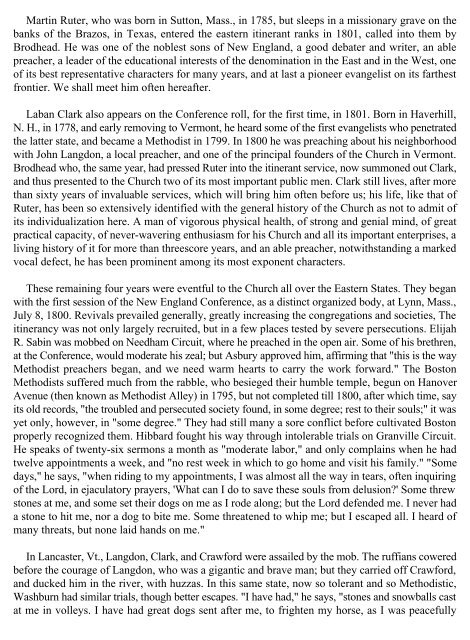History of the M.E. Church, Vol. IV - Media Sabda Org
History of the M.E. Church, Vol. IV - Media Sabda Org
History of the M.E. Church, Vol. IV - Media Sabda Org
Create successful ePaper yourself
Turn your PDF publications into a flip-book with our unique Google optimized e-Paper software.
Martin Ruter, who was born in Sutton, Mass., in 1785, but sleeps in a missionary grave on <strong>the</strong><br />
banks <strong>of</strong> <strong>the</strong> Brazos, in Texas, entered <strong>the</strong> eastern itinerant ranks in 1801, called into <strong>the</strong>m by<br />
Brodhead. He was one <strong>of</strong> <strong>the</strong> noblest sons <strong>of</strong> New England, a good debater and writer, an able<br />
preacher, a leader <strong>of</strong> <strong>the</strong> educational interests <strong>of</strong> <strong>the</strong> denomination in <strong>the</strong> East and in <strong>the</strong> West, one<br />
<strong>of</strong> its best representative characters for many years, and at last a pioneer evangelist on its far<strong>the</strong>st<br />
frontier. We shall meet him <strong>of</strong>ten hereafter.<br />
Laban Clark also appears on <strong>the</strong> Conference roll, for <strong>the</strong> first time, in 1801. Born in Haverhill,<br />
N. H., in 1778, and early removing to Vermont, he heard some <strong>of</strong> <strong>the</strong> first evangelists who penetrated<br />
<strong>the</strong> latter state, and became a Methodist in 1799. In 1800 he was preaching about his neighborhood<br />
with John Langdon, a local preacher, and one <strong>of</strong> <strong>the</strong> principal founders <strong>of</strong> <strong>the</strong> <strong>Church</strong> in Vermont.<br />
Brodhead who, <strong>the</strong> same year, had pressed Ruter into <strong>the</strong> itinerant service, now summoned out Clark,<br />
and thus presented to <strong>the</strong> <strong>Church</strong> two <strong>of</strong> its most important public men. Clark still lives, after more<br />
than sixty years <strong>of</strong> invaluable services, which will bring him <strong>of</strong>ten before us; his life, like that <strong>of</strong><br />
Ruter, has been so extensively identified with <strong>the</strong> general history <strong>of</strong> <strong>the</strong> <strong>Church</strong> as not to admit <strong>of</strong><br />
its individualization here. A man <strong>of</strong> vigorous physical health, <strong>of</strong> strong and genial mind, <strong>of</strong> great<br />
practical capacity, <strong>of</strong> never-wavering enthusiasm for his <strong>Church</strong> and all its important enterprises, a<br />
living history <strong>of</strong> it for more than threescore years, and an able preacher, notwithstanding a marked<br />
vocal defect, he has been prominent among its most exponent characters.<br />
These remaining four years were eventful to <strong>the</strong> <strong>Church</strong> all over <strong>the</strong> Eastern States. They began<br />
with <strong>the</strong> first session <strong>of</strong> <strong>the</strong> New England Conference, as a distinct organized body, at Lynn, Mass.,<br />
July 8, 1800. Revivals prevailed generally, greatly increasing <strong>the</strong> congregations and societies, The<br />
itinerancy was not only largely recruited, but in a few places tested by severe persecutions. Elijah<br />
R. Sabin was mobbed on Needham Circuit, where he preached in <strong>the</strong> open air. Some <strong>of</strong> his brethren,<br />
at <strong>the</strong> Conference, would moderate his zeal; but Asbury approved him, affirming that "this is <strong>the</strong> way<br />
Methodist preachers began, and we need warm hearts to carry <strong>the</strong> work forward." The Boston<br />
Methodists suffered much from <strong>the</strong> rabble, who besieged <strong>the</strong>ir humble temple, begun on Hanover<br />
Avenue (<strong>the</strong>n known as Methodist Alley) in 1795, but not completed till 1800, after which time, say<br />
its old records, "<strong>the</strong> troubled and persecuted society found, in some degree; rest to <strong>the</strong>ir souls;" it was<br />
yet only, however, in "some degree." They had still many a sore conflict before cultivated Boston<br />
properly recognized <strong>the</strong>m. Hibbard fought his way through intolerable trials on Granville Circuit.<br />
He speaks <strong>of</strong> twenty-six sermons a month as "moderate labor," and only complains when he had<br />
twelve appointments a week, and "no rest week in which to go home and visit his family." "Some<br />
days," he says, "when riding to my appointments, I was almost all <strong>the</strong> way in tears, <strong>of</strong>ten inquiring<br />
<strong>of</strong> <strong>the</strong> Lord, in ejaculatory prayers, 'What can I do to save <strong>the</strong>se souls from delusion?' Some threw<br />
stones at me, and some set <strong>the</strong>ir dogs on me as I rode along; but <strong>the</strong> Lord defended me. I never had<br />
a stone to hit me, nor a dog to bite me. Some threatened to whip me; but I escaped all. I heard <strong>of</strong><br />
many threats, but none laid hands on me."<br />
In Lancaster, Vt., Langdon, Clark, and Crawford were assailed by <strong>the</strong> mob. The ruffians cowered<br />
before <strong>the</strong> courage <strong>of</strong> Langdon, who was a gigantic and brave man; but <strong>the</strong>y carried <strong>of</strong>f Crawford,<br />
and ducked him in <strong>the</strong> river, with huzzas. In this same state, now so tolerant and so Methodistic,<br />
Washburn had similar trials, though better escapes. "I have had," he says, "stones and snowballs cast<br />
at me in volleys. I have had great dogs sent after me, to frighten my horse, as I was peacefully
















